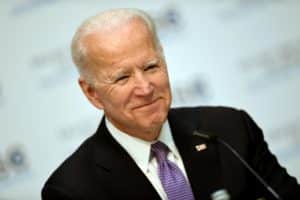Brad Garlinghouse, CEO di Ripple, has sparked a political and financial controversy with his recent statements regarding Biden and Gary Gensler, the chairman of the Securities and Exchange Commission (SEC) of the United States.
In an exclusive interview with a major financial network, Garlinghouse harshly criticized Gensler’s policies and actions, suggesting that they could have negative consequences for the Biden administration. His words immediately sparked a heated debate both within and outside the financial community.
Why according to the CEO of Ripple Biden will lose the elections?
According to Garlinghouse, the decisions made by Gensler could profoundly influence the investment climate in the United States, with potential repercussions on the cryptocurrency market and the financial sector as a whole.
His concerns have not gone unnoticed, with many industry experts expressing similar fears regarding the possible implications of the regulations proposed by the SEC. Garlinghouse says that overly strict regulation pushes companies and investors towards more welcoming jurisdictions.
However, Garlinghouse’s opinions have also sparked mixed reactions. Some critics believe that his remarks may be motivated by personal interests and the desire to protect Ripple’s interests, particularly in relation to the ongoing legal disputes the company has faced with the SEC. Others believe that his concerns are legitimate, highlighting the need to find a balance between technological innovation and investor protection.
Furthermore, Garlinghouse’s intervention took place in an already tense political context, with the Biden administration under pressure to address a series of economic and social challenges. His words highlighted the divisions within the US financial community regarding the role of regulation in promoting or restricting economic growth and innovation.
The context of Gensler
Gary Gensler, former economics professor at MIT and known for his strict positions on financial regulation, has taken the helm of the SEC with the declared goal of strengthening transparency and security in financial markets. His actions have already had a significant impact, with the SEC intensifying surveillance on cryptocurrencies and digital securities offerings, raising concerns among innovators in the sector.
Garlinghouse has expressed concerns that Gensler’s hard line could undermine the efforts of U.S. companies in the field of blockchain and cryptocurrencies.
The entire matter highlights a fundamental dilemma for the Biden administration: how to balance the need for regulation to protect investors and ensure financial stability, without stifling innovation and economic growth? It is a question that continues to divide opinions and fuel public debate.
Conclusions
While experts discuss the possible implications of Gensler’s policies and the responses of the financial community, one thing is clear: the decisions made by the SEC will have lasting consequences not only for the cryptocurrency sector but also for the economy as a whole. The challenge for the Biden administration will be to navigate these turbulent waters, finding a balance that supports technological innovation without compromising financial security and investor confidence.
In conclusion, while Brad Garlinghouse has raised important issues regarding Gary Gensler’s policies, it remains to be seen how the SEC will address the upcoming challenges and what the impact will be on the global financial landscape.


